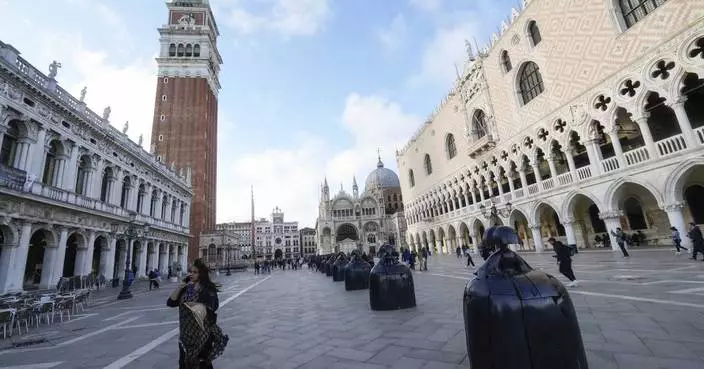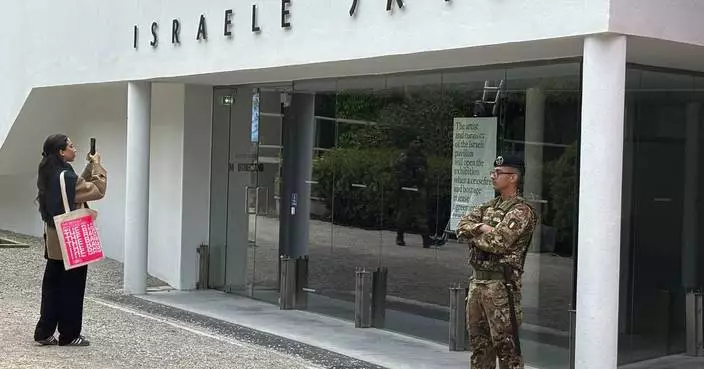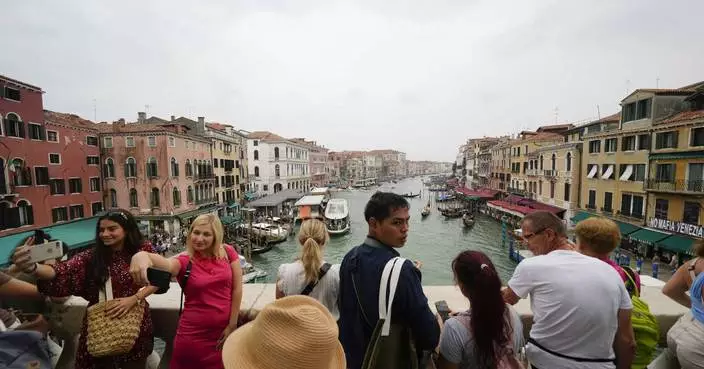It's a rule of cinema that a movie about a boy and a horse will tug at the heartstrings.
Venice Film Festival entry "Lean on Pete" is no exception. Andrew Haigh's drama is about Charley, a lonely 15-year-old boy who befriends a tired old racehorse and sets out on a perilous journey across the American West.

From left, director Andrew Haigh, actors Chloe Sevigny and Charlie Plummer, and producer Tristan Goligher arrive on the red carpet of the film "Lean On Pete" at the 74th Venice Film Festival in Venice, Italy, Friday, Sept. 1, 2017. (AP Photo/Domenico Stinellis)
The movie is set in a contemporary working-class America of motels, diners and grubby racetracks, but Haigh says it also has "almost a fable-esque element about it."
"Traditional folk tales are set in very bleak environments, often, but they have a slight beauty to them at the same time," Haigh told the Associated Press Friday as rain lashed Venice's beach-fringed Lido island.
"Lean on Pete," one of 21 films competing for festival's Golden Lion prize, is the first American movie by British director Haigh. His past two films focused on two young gay men who have a brief but intense relationship ("Weekend") and a long-married couple at a crisis point ("45 Years").
Haigh said all his films have been about "contemporary loneliness and absence," and "Lean on Pete" continues the theme.

Actor Charlie Plummer arrives on the red carpet for the movie "Lean On Pete" at the 74th Venice Film Festival at the Venice Lido, Italy, Friday, Sept. 1, 2017. (AP Photo/Domenico Stinellis)
Based on a novel by U.S. writer Willy Vlautin, it centers on Charley, who has spent his life moving from town to town with his loving but feckless father. In need of both money and affection, he winds up at the track helping a rackety horse trainer played by Steve Buscemi, and a kindly but steely jockey played by Chloe Sevigny.
Any hopes they will be a surrogate family are soon dashed, and Charley's isolation worsens. Soon the horse Lean on Pete is his only companion.
"He's such a good kid, but incredibly isolated and lonely," Haigh said. "Everyone disappoints him."
As Charley and his silent companion strike out from Oregon for Wyoming, the film is powered by a touching and understated central performance by 18-year-old Charlie Plummer.

Actress Cloe Sevigny arrives on the red carpet for the movie "Lean On Pete" at the 74th Venice Film Festival at the Venice Lido, Italy, Friday, Sept. 1, 2017. (AP Photo/Domenico Stinellis)
"I think he just possesses something that so many other actors don't have, some kind of innate subtlety and sensitivity," Haigh said of Plummer, who is soon to appear as wealthy kidnap victim John Paul Getty III in Ridley Scott's "All the Money in the World."
"I think he has a way of finding some kind of truth in a scene that feels surprising."
The film takes an effectively understated approach to depicting the hardscrabble underside of American life, never overplaying the grittiness even as Charley's situation becomes more desperate.
"We were careful not to amp up the Americana of the story," Haigh said. "Because for those people who live there, it's just where they live. The same with the landscapes — we wanted to show those landscapes, show Charley within those landscapes, but not fetishize those landscapes."
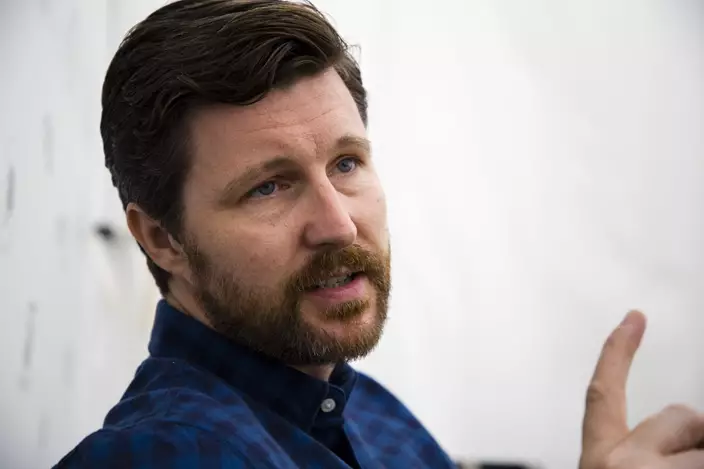
Director Andrew Haigh speaks during an interview with The Associated Press for the film "Lean On Pete" at the 74th Venice Film Festival in Venice, Italy, Friday, Sept. 1, 2017. (AP Photo/Domenico Stinellis)
The film's final major character presented his own challenges. Haigh said working with Starsky, the horse who played Pete, was "like working with a very small child."
"The horse was very well trained," he said "You work out in pre-production what you want the horse to do, whether you want it to lift its leg (and so on). It's all very precise.
"By the time you're shooting it kind of works all right, but it is still a horse. You can't make it do something it doesn't want to do."
Plummer, who spent several weeks building a bond with the horse before filming started, said acting alongside an animal was challenging but rewarding.
"I think the horse did a tremendous job in the film, and I think he gives a wonderful performance," he said.
KHARKIV, Ukraine (AP) — A 79-year-old woman makes the sign of the cross and, gripping her cane, leaves her home in a quaint village in northeast Ukraine.
Torn screens, shattered glass and scorched trees litter the yard of Olha Faichuk's apartment building in Lukiantsi, north of the city of Kharkiv. Abandoned on a nearby bench is a shrapnel-pierced cellphone that belonged to one of two people killed when a Russian bomb struck, leaving a blackened crater in its wake.
“God, forgive me for leaving my home, bless me on my way,” Faichuk said, taking one last look around before slowly shuffling to an evacuation vehicle.
Unlike embattled front-line villages further east, attacks on the border village near the Russian region of Belgorod, were rare until a wave of air strikes began in late March.
Russia seemingly exploited air defense shortages in Kharkiv, Ukraine’s second-largest city, to pummel the region's energy infrastructure and terrorize its 1.3 million residents. Nearly 200,000 city dwellers remain without power, while 50% of the region's population still suffers from outages, officials say.
As utilities clamber to meet electricity demand before the onset of winter in six months, Russia continues to unleash deadly aerial-glide bombs to drive more residents away. Some officials and analysts warn it could be a concerted effort by Moscow to shape conditions for a summer offensive to seize the city.
Acknowledging the need to strengthen air defenses, Oleh Syniehubov, the governor of Kharkiv region, said: “We clearly understand that the enemy actually uses this vulnerability every day.”
Kharkiv's struggles reflect a wider problem: As Western allies drag their feet in delivering promised aid to Kyiv, Moscow is patiently escalating until — it hopes — Ukrainian resistance snaps.
The attacks, which began on March 22, annihilated Kharkiv’s ability to generate and distribute electricity.
Missiles fired from Belgorod take 30 seconds to reach their targets in Kharkiv, just 30 kilometers (18 miles) away, which is about the same amount of time that air defense systems need to respond. In the last barrage, Russia launched 22 missiles simultaneously to swarm and disorient those defenses, Syniehubov said.
Energy workers also had just 30 seconds to find cover.
At CHP-5, a plant in Kharkiv that generates electricity and heat, the acrid stench of smoke still hangs in the air. Its damaged generator and turbine must be replaced, according to plant manager Oleksandr Minkovich.
The plant supplied 50% of the region’s electricity and 35% of the city’s heating, Minkovich said. It has been attacked six times since the Russian invasion began, but the latest barrage destroyed “any possibility” for power generation, he said.
Spare parts for the Soviet-era plant can only be sourced from Russia, and full restoration would likely take years, he said. But Minkovitch hopes Ukraine's Western partners will provide modern technology to decentralize power in time for winter.
Without this, he said, he's unsure how to meet demand.
To keep the lights on, power is diverted to Kharkiv from neighboring regions, but this process overloads the grid and causes unscheduled blackouts. Businesses rarely know when, and for how long, they can rely on the grid.
“We wake up every day and have no idea if we will have power or not,” said Oleh Khromov, the owner of a popular Kharkiv restaurant, Protagonist.
Of dozens of former residents, only 10 remain in Faichuk’s apartment block in Lukiantsi.
“Why are they killing us?” Valentyna Semenchenko, 71, said, weeping as her friend was driven away.
Serhii Novikov, a volunteer with the NGO “I Am Saved,″ which organizes evacuations, said the uptick in Russia’s use of aerial-glide bombs is making more communities near the Belgorod border uninhabitable.
If a bomb even falls close to a house, then that “house that is not suitable for habitation because the shock wave is so large that it destroys everything in its path,” Novikov said.
Yulia Shdanevych made the painful decision to leave her home in the nearby village of Liptsi after two adults and a child were killed in an April 10 air strike. Earlier missile and mortar attacks didn't cause any deaths, but that changed with the introduction of aerial bombs.
“Before they would target one manufacturing building,” Shdanevych said. “Now it’s as though they are attacking civilians directly.”
There was no power at a Kharkiv shelter when Shdanevych arrived, and she filled out paperwork by the light of a battery-powered lamp. Director Ihor Kasinksy said the facility suffers from power and water outages.
Before the war, 2,000 people lived in the village of Rubizhne, 14 kilometers from the Russian border. Today, only 60 remain, including Olha Bezborodova. But she is uncertain how long she will stay.
“It's really hard. If we had light it would be easier,” Bezborodova said, cradling her toddler. She said organizations have helped her to fix her home, “but they (the Russians) are not finished, they are bombing all the time.”
Ukrainian officials are divided on the significance of the recent attacks on Kharkiv.
President Volodymyr Zelenskyy has said it is no secret that Russia wants to take the region, but Ukraine’s military intelligence calls rumors of an upcoming offensive a “psychological operation” to stir panic. Analysts argue a larger offensive can't be ruled out, pointing to the intensity of recent assaults.
Ukraine is not taking any chances and has established fortifications on the outskirts of the city.
Oleksander, an engineer with one company involved in that work, said crews have been digging anti-tank ditches, laying dragon’s teeth and building a network of trenches to keep Russian forces at bay. He was not permitted to share his last name or that of his company for security reasons.
He has a deadline of early May to complete the job. “We will be on time,” he said.
Meanwhile, cafes and restaurants remain busy in Kharkiv, where locals have grown accustomed to speaking over the roar of generators. In Protagonist, an alternative menu presents options to order when the power is off.
“The people who are staying here and keeping businesses open and trying to do something, they are not tragic characters with nowhere to go,” said Khromov. “They are a special kind of perverted enthusiast who are trying to make sense of it, who are still interested in building something.”
At a bakery nearby, workers manually record sales, so they can ration power to keep food cool.
“We try to cope,” said Oleksandra Silkina, 34.
“We have been attacked since 2022, all the time, so we are used to these attacks,” she added. “We won’t leave this city. It’s our city.”
Associated Press journalist Volodymyr Yurchuk contributed from Kharkiv.

Dmytro Zhdanevych, 15, looks though the window of a car as he is evacuated from the village of Lyptsi to Kharkiv, Ukraine, on Monday, April 15, 2024. (AP Photo/Evgeniy Maloletka)
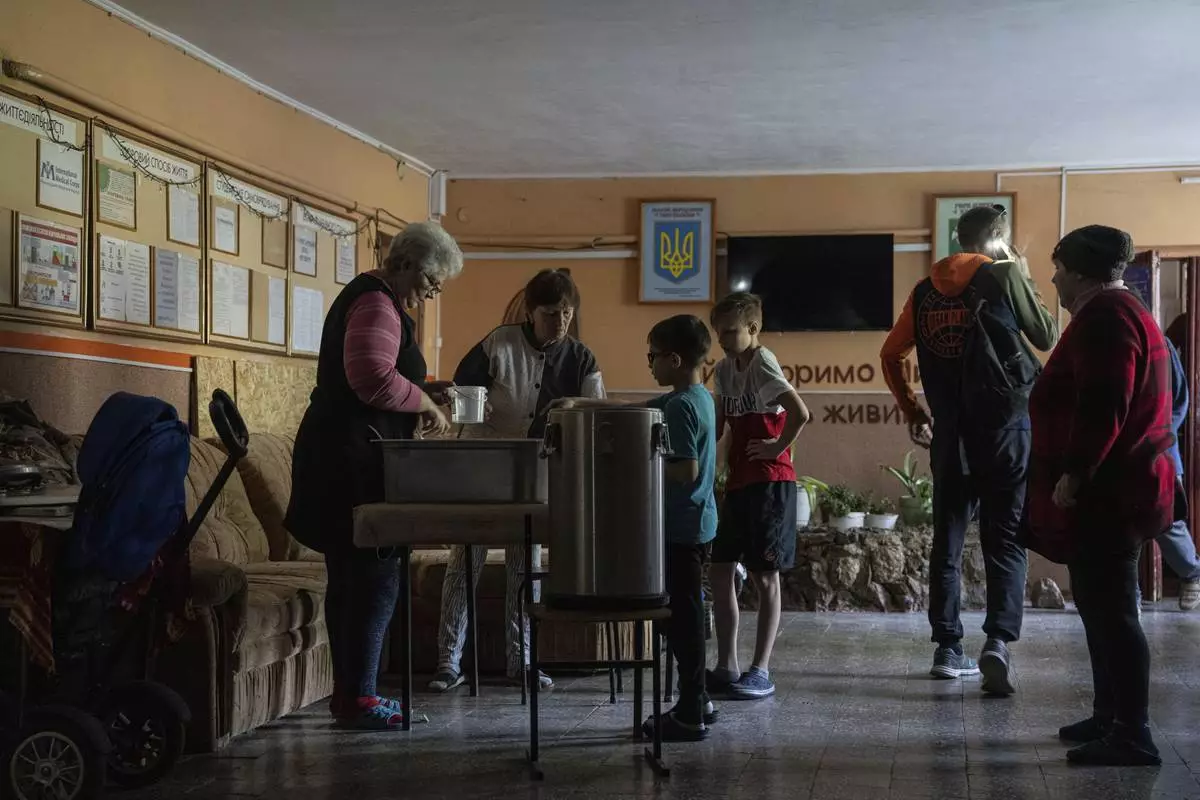
Volunteers provide food to children who were evacuated from the front lines at a shelter for displaced people in Kharkiv, Ukraine, on Monday, April 15, 2024. (AP Photo/Evgeniy Maloletka)

A saleswoman places goods in a refrigerator in a store that runs on a generator after the municipality temporarily cut the power to conserve energy in Kharkiv, Ukraine, on Sunday, April 14, 2024. (AP Photo/Evgeniy Maloletka)
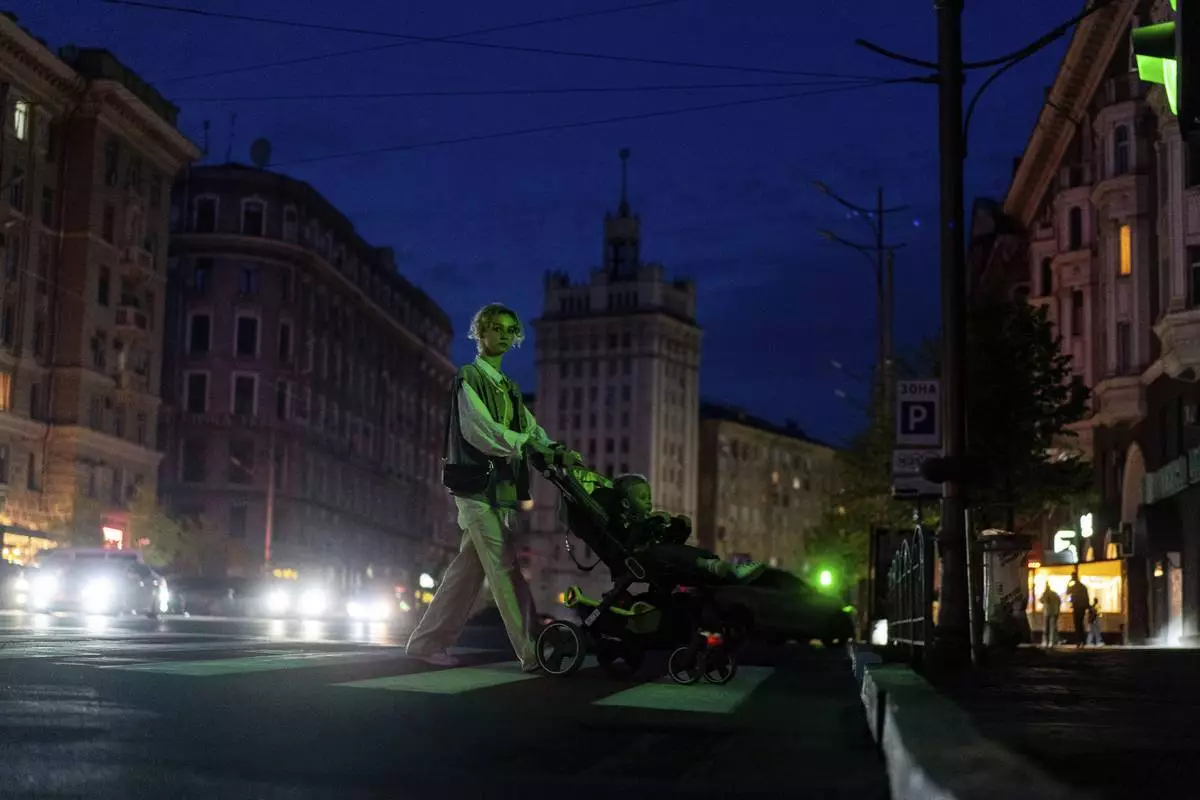
A woman pushes a cart carrying her child across a dark street after the municipality cut the city lights to conserve energy in Kharkiv, Ukraine, on Sunday, April 14, 2024. (AP Photo/Evgeniy Maloletka)
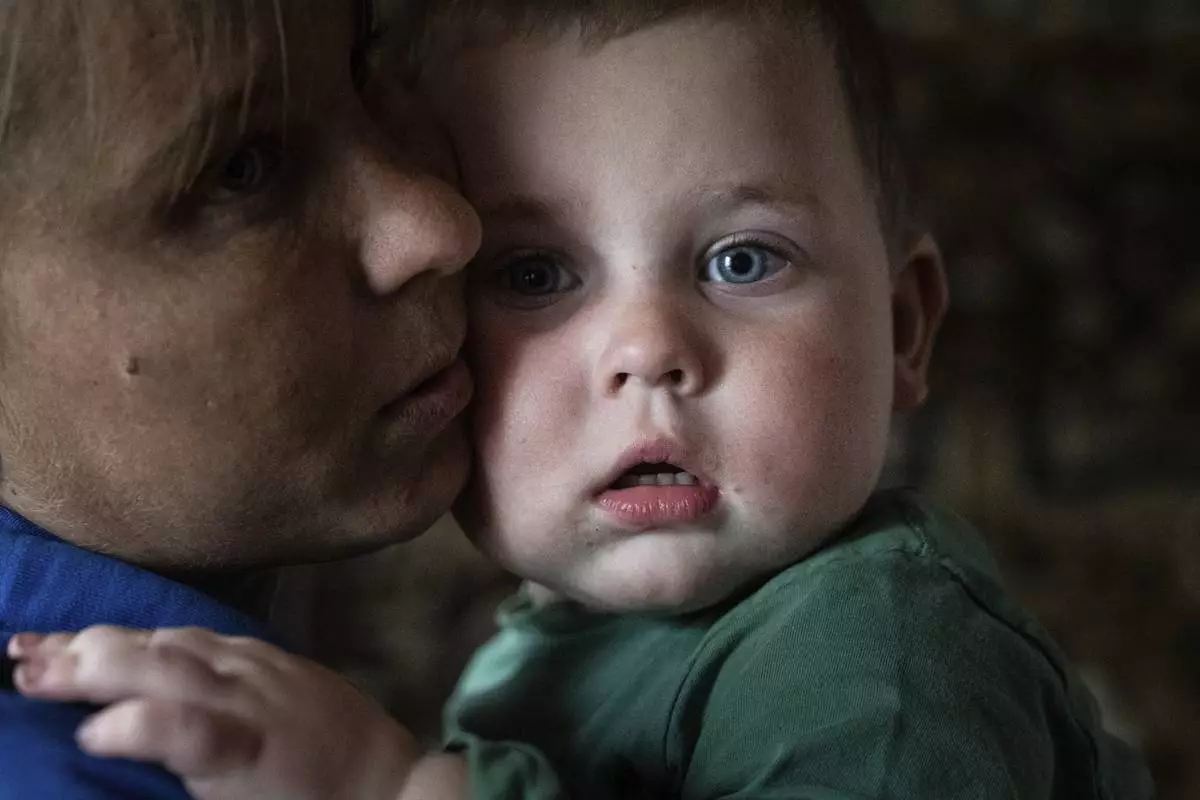
Olga Bezborodova calms her 20-month-old son, Mykola, in her home, which has no electricity, in the village of Rubizhne, Kharkiv region, Ukraine, on Wednesday, April 17, 2024. (AP Photo/Evgeniy Maloletka)
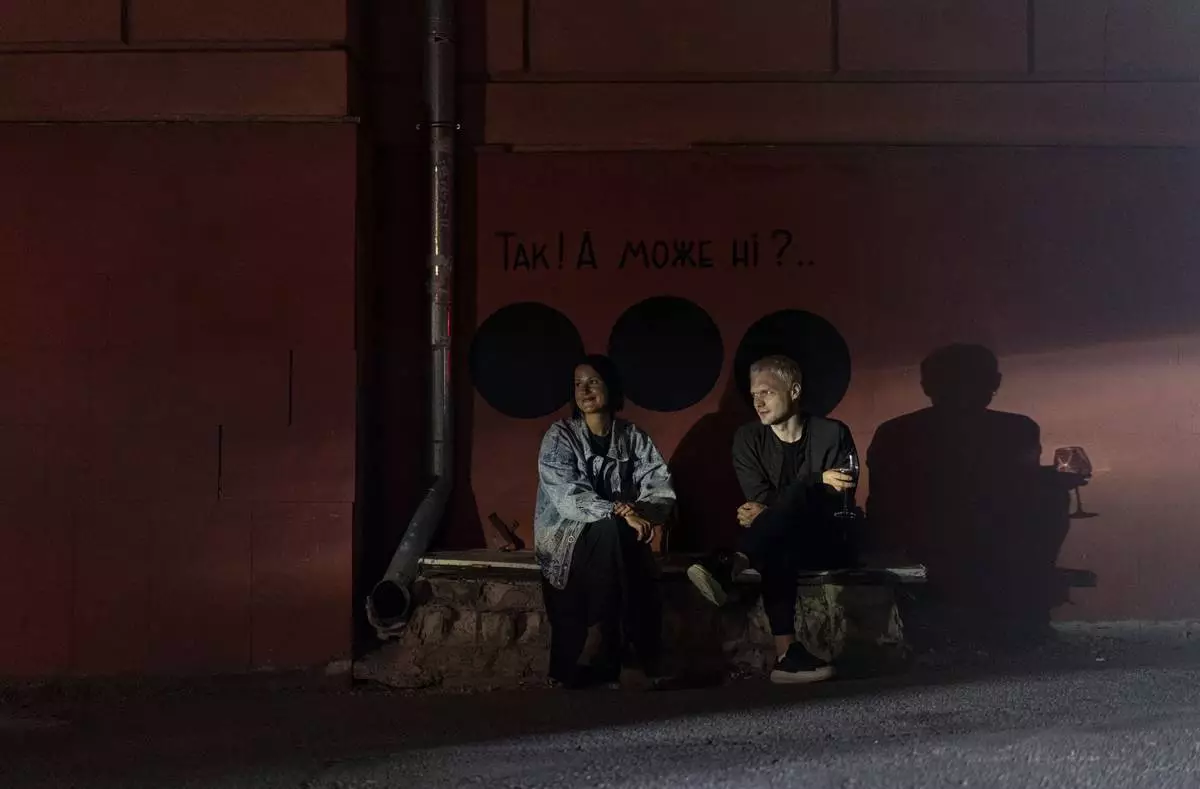
Oleh Khromov, the owner of Protagonist restaurant in Kharkiv, Ukraine, drinks wine with his wife Olena in the dark after the municipality temporarily cut the power to conserve energy, on Sunday, April 14, 2024. (AP Photo/Evgeniy Maloletka)
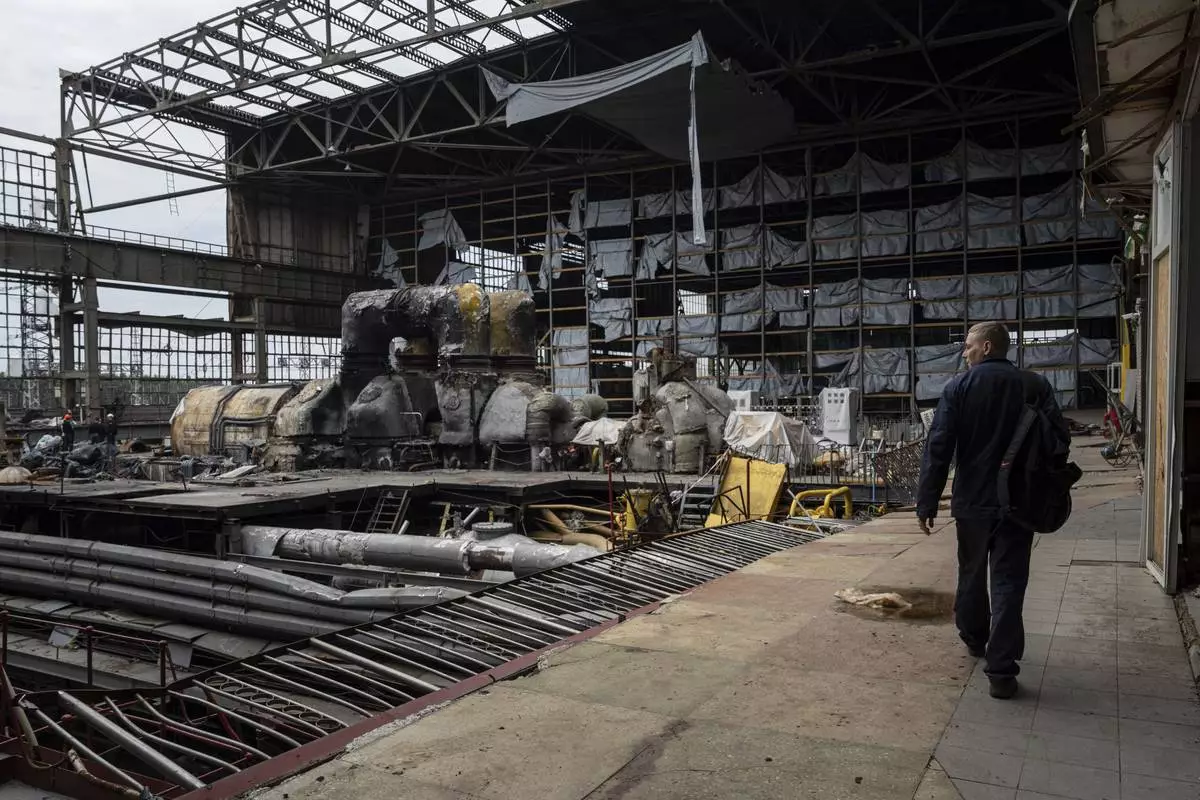
A worker walks inside a power plant that was destroyed by a Russian rocket attack on March 22, in Kharkiv, Ukraine, on Wednesday, April 17, 2024. (AP Photo/Evgeniy Maloletka)
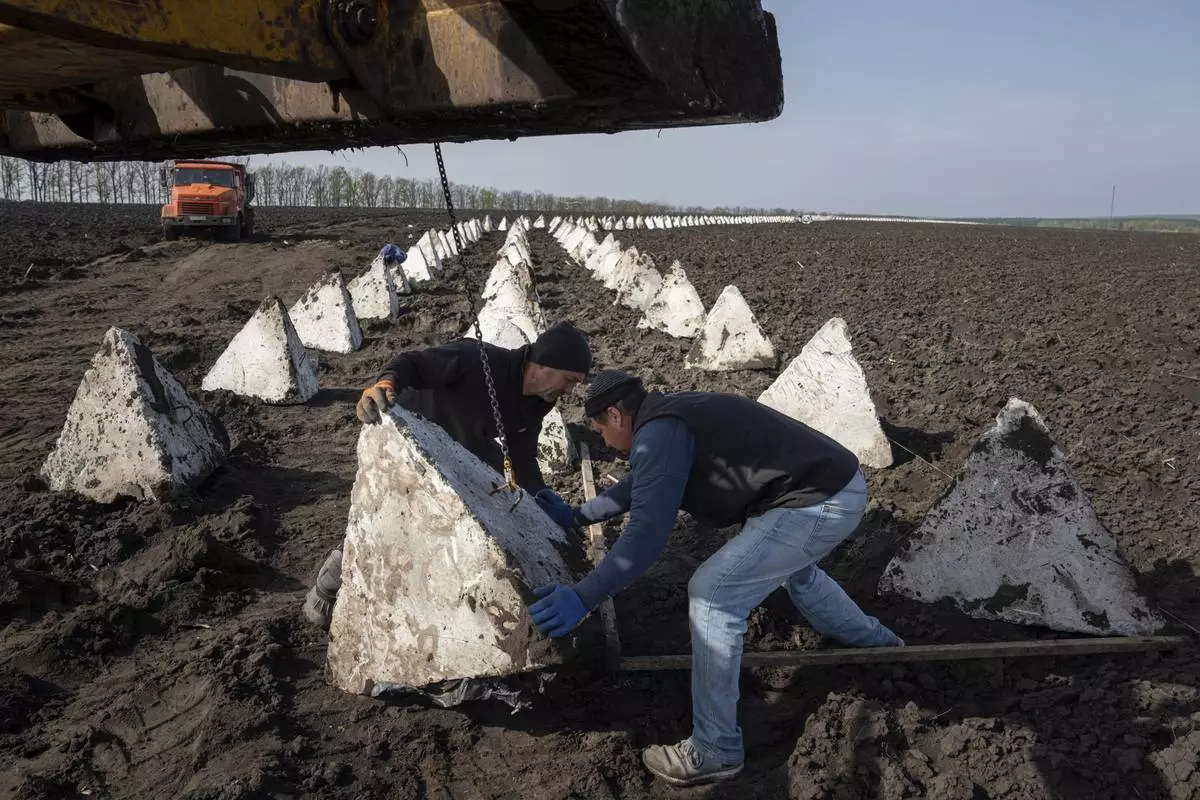
Workers install dragon teeth during the construction of new defensive positions close to the Russian border in Kharkiv region, Ukraine, on Wednesday, April 17, 2024. (AP Photo/Evgeniy Maloletka)
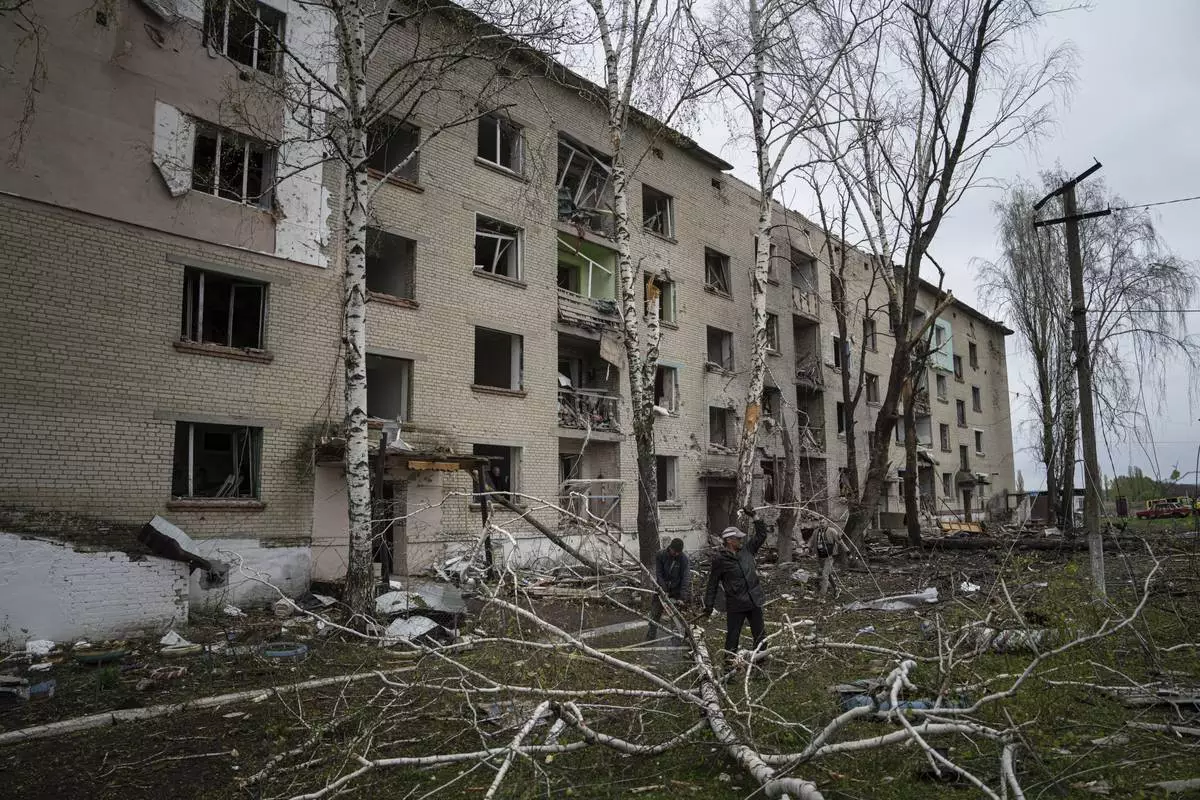
FILE - Local men cut trees in front of a residential building that was heavily damaged by a Russian airstrike in Lukiantsi, Kharkiv region, Ukraine, on Tuesday, April 16, 2024. (AP Photo/Evgeniy Maloletka, File)
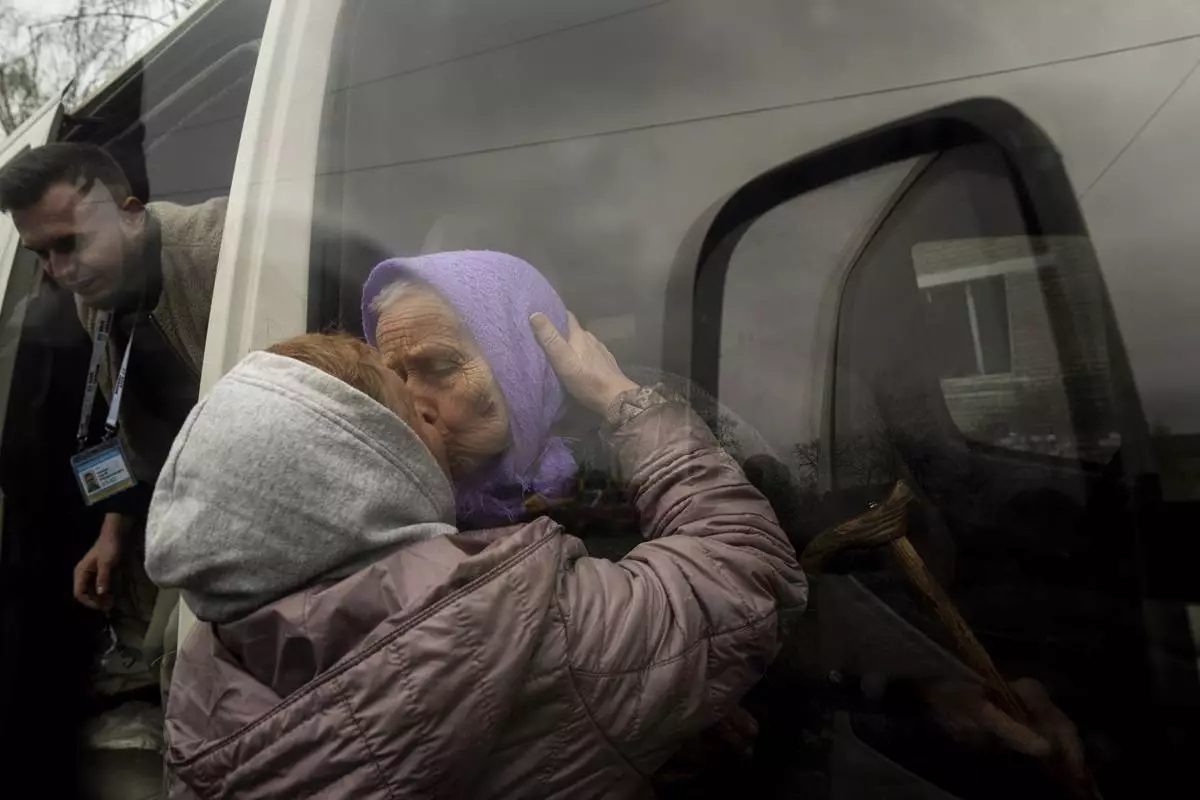
FILE - Olha Faichuk, 79, kisses her neighbor as she is evacuated from her home, which was heavily damaged by a Russian airstrike in Lukiantsi, Kharkiv region, Ukraine, on Tuesday, April 16, 2024. (AP Photo/Evgeniy Maloletka, File)

FILE - Olha Faichuk, 79, is seen through a car window as she is evacuated from her home, which was heavily damaged by a Russian airstrike, in Lukiantsi, Kharkiv region, Ukraine, on Tuesday, April 16, 2024. (AP Photo/Evgeniy Maloletka, File)
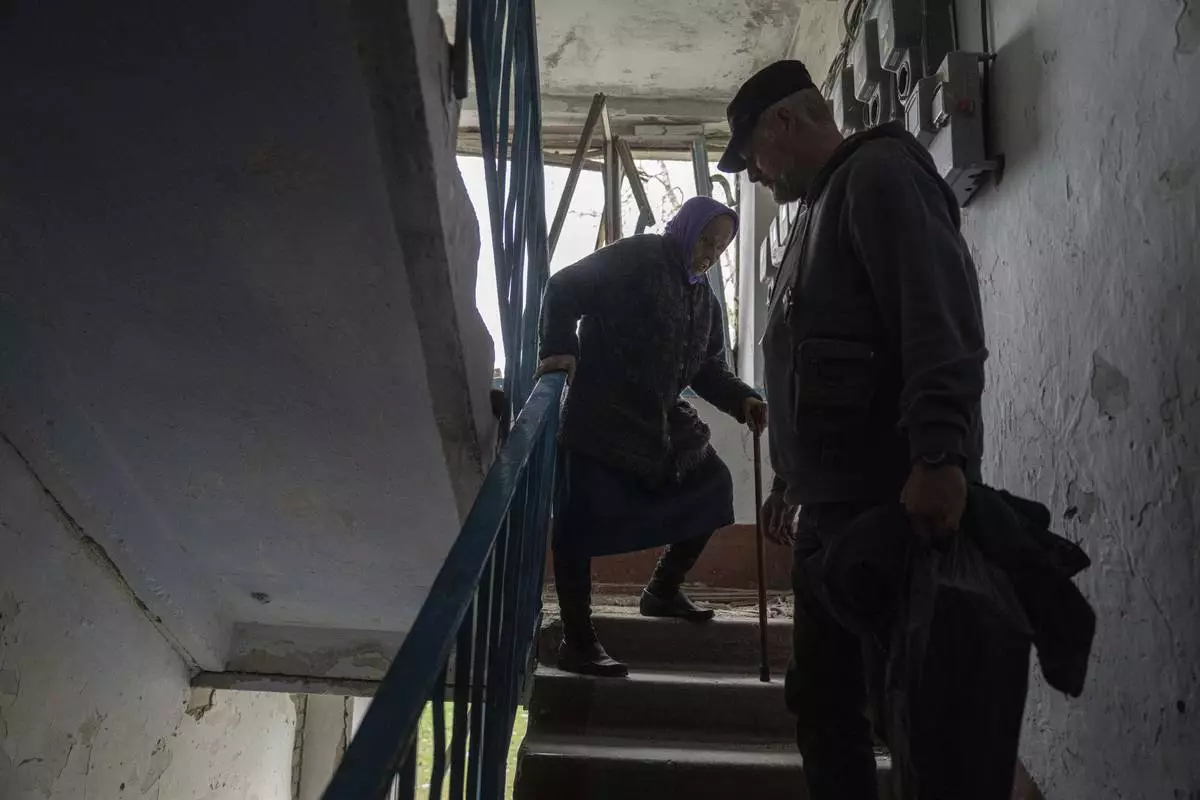
FILE - A volunteer helps Olha Faichuk, 79, down the stairs from her apartment, which was heavily damaged by a Russian airstrike, in Lukiantsi, Kharkiv region, Ukraine, on Tuesday, April 16, 2024. (AP Photo/Evgeniy Maloletka, File)
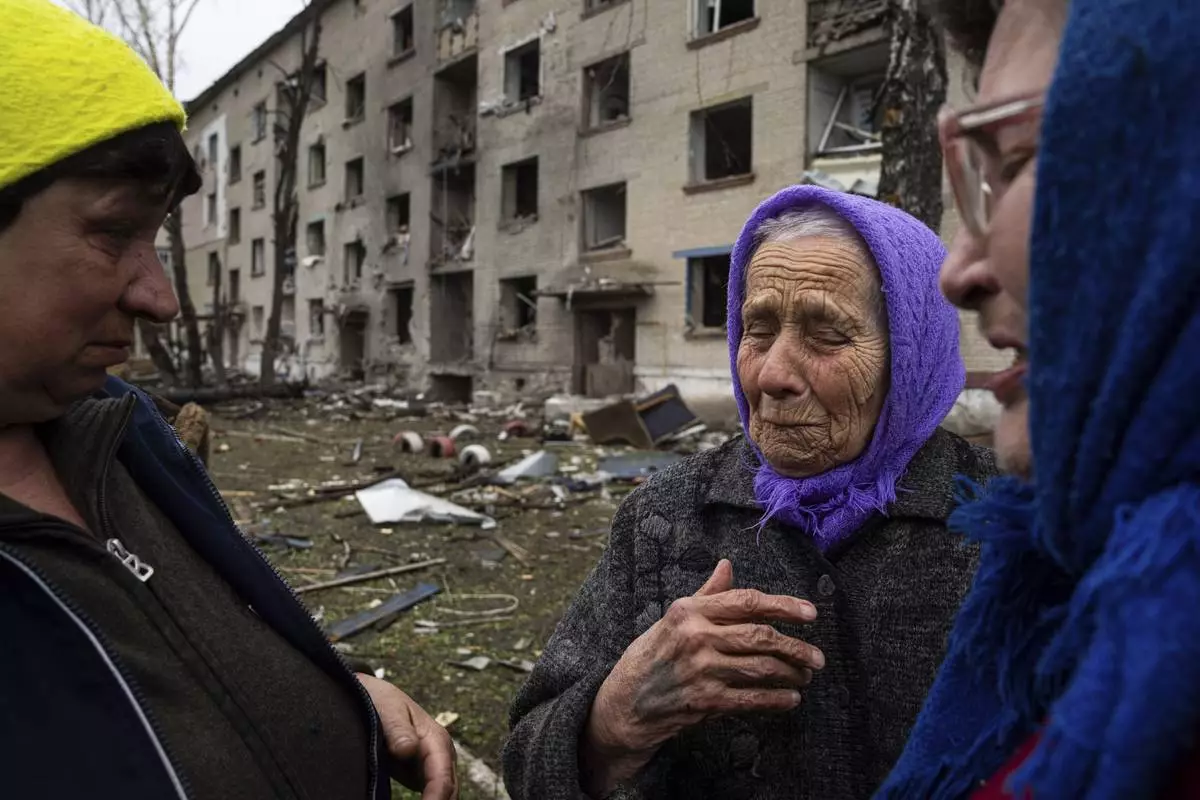
FILE - Olha Faichuk, 79, center, cries as she says goodbye to her neighbors in front of her apartment building, which was heavily damaged by a Russian airstrike, in Lukiantsi, Kharkiv region, Ukraine, on Tuesday, April 16, 2024. (AP Photo/Evgeniy Maloletka, File)
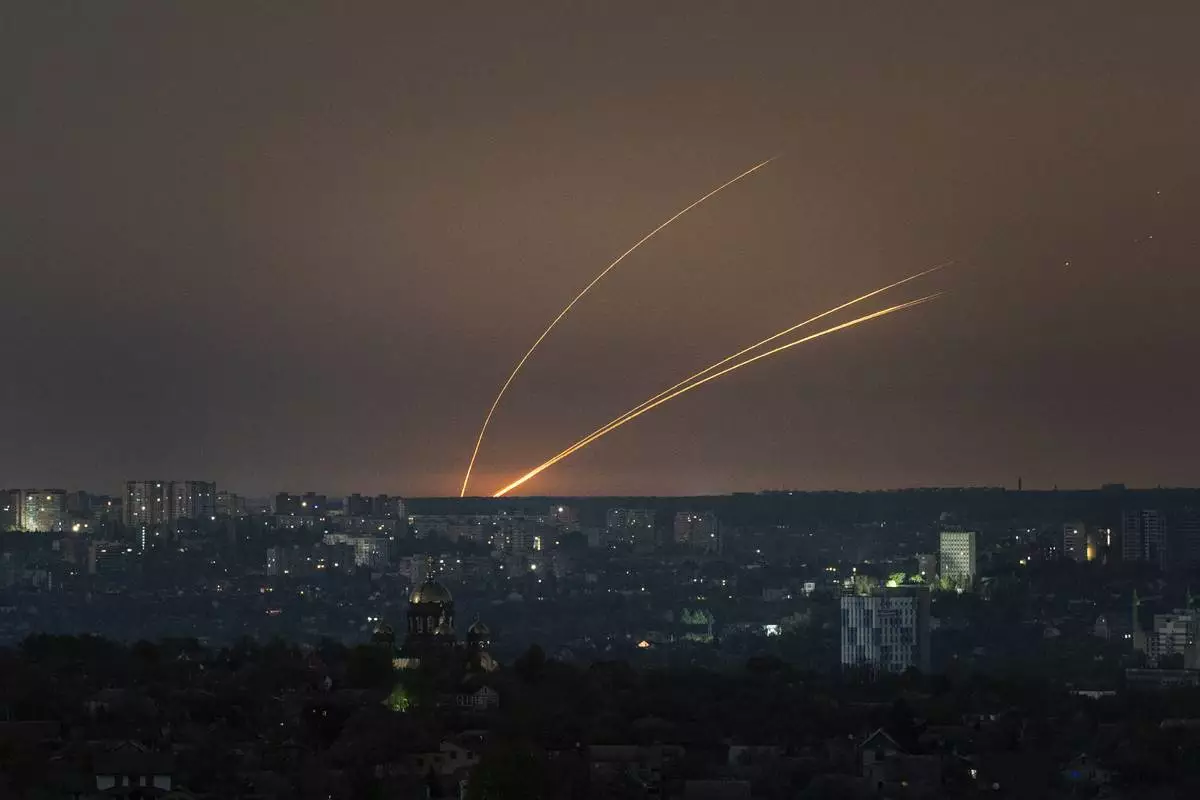
Russian rockets are launched against Ukraine from Russia's Belgorod region, seen from Kharkiv, Ukraine, on Thursday, April 18, 2024. (AP Photo/Evgeniy Maloletka)





















